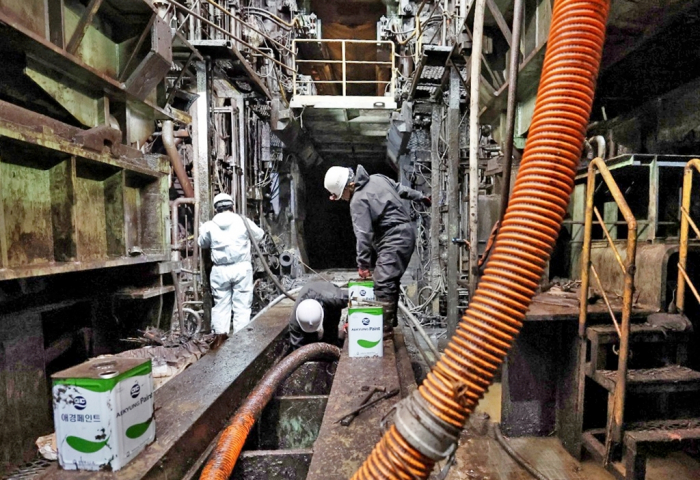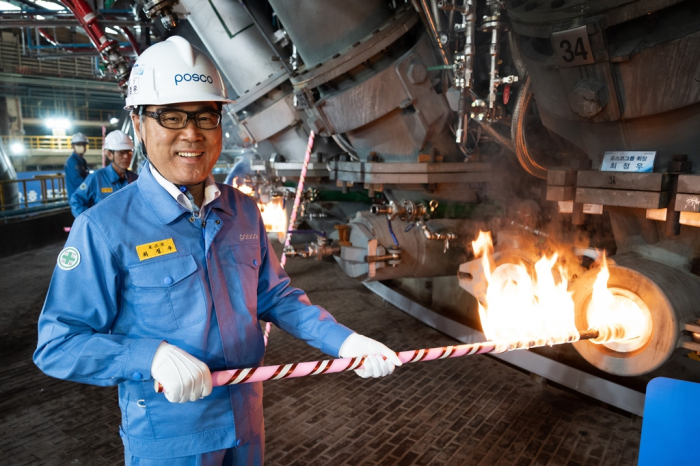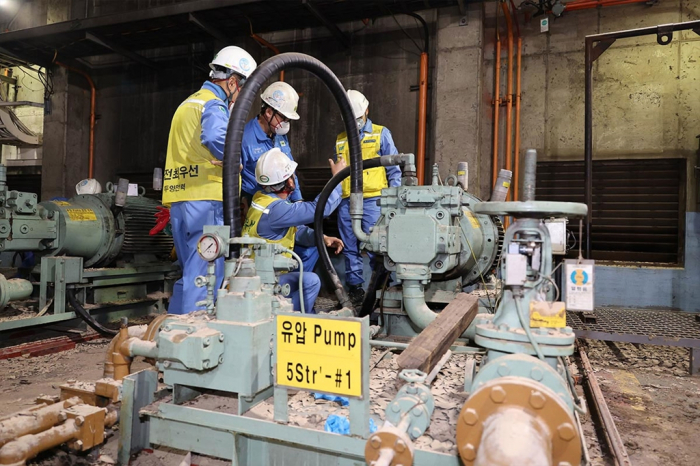The Deep Dive
Typhoon may offer Korea excuse it needs to oust POSCO CEO
None of the group CEO's predecessors completed their term; POSCO vows to normalize storm-hit plant by year-end
By Sep 15, 2022 (Gmt+09:00)
5
Min read
Most Read
LG Chem to sell water filter business to Glenwood PE for $692 million


Kyobo Life poised to buy Japan’s SBI Group-owned savings bank


KT&G eyes overseas M&A after rejecting activist fund's offer


StockX in merger talks with Naver’s online reseller Kream


Mirae Asset to be named Korea Post’s core real estate fund operator



South Korea is set to investigate POSCO, the world’s sixth-largest steelmaker, to clarify who is responsible for the damage to its typhoon-hit plant, which normally accounts for a quarter of local steel production, with senior government officials citing concerns over its corporate governance.
The probe has stoked speculation in domestic business circles that the government is looking to replace POSCO Group Chief Executive Choi Jeong-woo, who took office during the previous Moon Jae-in administration.
Last week, the country’s top steelmaker shut down all of its three blast furnaces at Pohang Steel Works for the first time in 49 years due to Typhoon Hinnamnor. The company has since restarted all of the furnaces but some other facilities remain idle.
The Ministry of Trade, Industry and Energy on Wednesday said it plans to set up a public-private joint team this week to identify in detail damage to the plant and its impact on local steel supply while preparing measures to support the restoration work.
The team will focus on why the steel mill was so badly afflicted despite earlier storm forecasts and how the restoration work is progressing, probing into POSCO’s preparation against the typhoon and follow-up measures.
“The damage is so serious that it is hard to find a precedent,” Vice Minister of Trade, Industry and Energy Jang Young-jin said in a briefing, which had not been scheduled for this week. “We will focus on why the plant was so seriously damaged even as Typhoon Hinnamnor was sufficiently forecast.”
The ministry said the probe aims to accurately predict the timing of the normalization of the plant and stabilize the supply chain sooner, adding that steel is a key material for all domestic industries.
Senior government officials, however, stressed that management is also responsible.
“The investigation’s results may raise issues of the management’s responsibility,” said one of the officials. The other source pointed out that the damage from the typhoon could harm POSCO’s corporate governance in the mid- to long term.
OUT WITH CEO CHOI?
Sources from the local business circle saw the move as aimed at the CEO, saying authorities have tried to excessively intervene in the management of POSCO, previously a state-run company, through the probe.
The government has no stake in the country's top steelmaker, which was privatized in October 2000, although the National Pension Service holds a 9.25% stake as of end-June.
The business community was skeptical of the government’s intention because the typhoon’s victim POSCO is the object of the investigation, with industry sources citing Choi as the main target. In March 2021, Choi entered his second three-year term.

An industry ministry official dismissed such speculation, saying “the investigation aims to prevent such a disaster from happening again.”
NONE OF CHOI’S PREDECESSORS COMPLETED THEIR TERMS
POSCO Group’s officials in charge of relationships with the authorities have been keeping an eye on any signs of pressure from the new government regarding Choi's replacement since early March when former prosecutor general Yoon Suk-yeol was elected the country's president.
None of Choi’s predecessors completed their term due to political pressure. The previous CEO Kwon Oh-joon abruptly stepped down when he had two more years to serve. Kwon, who was appointed during the Park Geun-hye administration, was not included in the economic delegation list when then-President Moon made four overseas visits.
Former POSCO CEOs Lee Ku-taek and Chung Joon-yang, who took office after the company’s privatization, also resigned during their terms.
Lee stepped down in 2009, a year after the inauguration of former President Lee Myung-bak due to a probe by the prosecution over alleged tax investigations. Chung, who was appointed during the Lee administration, quit in 2013 during the Park administration as he was charged with breach of trust but acquitted.
GOVERNMENT CITES MANAGEMENT’S RESPONSIBILITY
Despite such speculation, the government is holding management responsible for the damage from the typhoon, saying it could have been minimized if the company was adequately prepared. Some senior ministry officials said POSCO intentionally highlighted the restarting of the furnaces while playing down the damage from the storm.
“It will take months to roll out actual products, but POSCO emphasized it resumed operations of the furnaces,” said one of the officials.
Vice Minister Jang on Wednesday said it will take up to six months to restore one of the hot rolled plants and also a long time to reinstate the others.
POSCO’s rolling facilities at the plant, which manufacture products such as hot rolled steel and cold rolled steel, remain idle and the company is only currently able to produce steel slabs.
TO RESTART ALL FACILITIES BY YEAR-END
The company on Thursday pledged to normalize all the facilities at the steel mill, about 350 kilometers southeast of Seoul, defying the vice minister’s estimate.
POSCO aims to restore the rolling facilities, which are currently under drainage and mud removal work, in three months with a target to restart one of the lines early next month and the other in December.
The company plans to relocate equipment such as transformers from its own domestic steel mill in Gwangyang, which was not affected by the typhoon, for rolling facilities including the hot rolled plant, if the existing equipment at the Pohang plant is not restored.

POSCO also argued against the government’s doubts over its preparation, saying the company took sufficient measures against the storm. It conducted maintenance works for drains and other safety facilities before the typhoon landed.
But those steps did not work as a nearby river flooded due to heavy rain and the high tide off the port city of Pohang, the company said.
Some experts said the river flooded as the city government narrowed the stream when it carried out maintenance works for the river from 2012 to 2017.
Write to Ik-Hwan Kim, Ji-Hoon Lee and Kyung-Min Kang at lovepen@hankyung.com
Jongwoo Cheon edited this article.
More to Read
-

-
 SteelPOSCO partially restarts Pohang furnaces flooded by typhoon
SteelPOSCO partially restarts Pohang furnaces flooded by typhoonSep 12, 2022 (Gmt+09:00)
2 Min read -
 SteelTyphoon Hinnamnor shuts all POSCO furnaces for 1st time in 49 years
SteelTyphoon Hinnamnor shuts all POSCO furnaces for 1st time in 49 yearsSep 07, 2022 (Gmt+09:00)
1 Min read -
 EconomyShipyards, TV plants to shut down as typhoon lands on Korea
EconomyShipyards, TV plants to shut down as typhoon lands on KoreaSep 05, 2022 (Gmt+09:00)
2 Min read -
 Business & PoliticsS.Korea's president-elect Yoon vows deregulation, tax cuts
Business & PoliticsS.Korea's president-elect Yoon vows deregulation, tax cutsMar 10, 2022 (Gmt+09:00)
6 Min read -
 SteelPOSCO CEO enters 2nd term with focus on eco-friendly markets
SteelPOSCO CEO enters 2nd term with focus on eco-friendly marketsMar 12, 2021 (Gmt+09:00)
1 Min read
Comment 0
LOG IN


